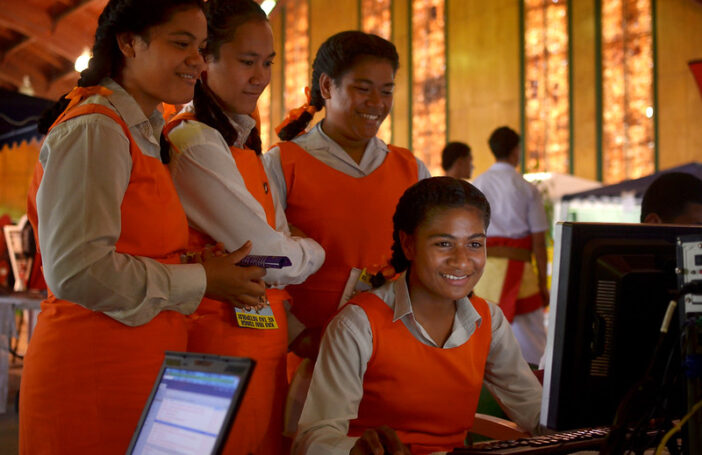In this, the last blog digest for the year and in fact our final post of 2012, we present the 12 most popular posts for the year, summarized below in chronological order.
March 16 ‘Pacific Futures’: The World Bank challenges conventional thinking on the Pacific island region by Stephen Howes and Jonathan Pryke.
This post summarises a 2012 World Bank report, Pacific Futures, presented at the ANU by Ferid Belhaj and Vivek Suri from the World Bank that represents a different way of thinking about the Pacific.
“Pacific Futures not only challenges conventional wisdom about the Pacific, but in some cases turns it on its head.”
April 11 Child sponsorship works? by Terence Wood.
Terence Wood, PhD student, Devpolicy Research Associate, and our star blogger, looks at what recent impact evaluations have to say on a long-standing development question, whether child sponsorship works.
“On the basis of best available evidence child sponsorships come out looking quite good.”
April 12 ‘Bad governance and politics and PNG’s lost decade’ by Andrew Anton Mako.
In this post, Andrew Mako, part of the PNG PEPE team, reflects on PNG’s lost decade of high growth but missed opportunities.
“I am from a very remote village deep in the Highlands of PNG, and in the last fifteen years, the single health center, a primary school which I attended as a boy, an airstrip that brings supplies to the village, and agricultural extension services, all closed down, and shrubs are now growing on a new road which was built in the late-1990s to connect my village to the nearest town. The 10,000 plus people in that part of the country are literally struggling each day. That is the grim situation of most parts of rural PNG.”
April 17 ‘Painful aid’ by Nik Soni.
Nik Soni, Chair of the Pacific Institute of Public Policy, and another Devpolicy Research Associate, takes no prisoners in this post on aid fads, including results-orientation, and zero tolerance for fraud.
“There is a growing concern amongst many practitioners in the field that the those in charge of development at the highest institutional levels have simply lost touch with reality.”
May 4 ‘End of the aid boom? The impact of austerity on aid budgets, and implications for Australia’ by Kathryn Zealand and Stephen Howes.
Kathryn worked with us as a researcher last year. By analysing individual government budget documents, we forecast a negative outlook for global aid.
“Our analysis of 2012 budget documents … suggests that more cuts are on their way, and that this is indeed the end of the aid boom.”
May 9 ‘Weak on quantity, strong on quality: the 2012 Australian aid budget’ by Stephen Howes.
We provided some good coverage of the aid budget this year, and plan to do more of the same next year.
“Though it will probably go little noticed, the budget did contain a number of aid reforms which push forward the aid effectiveness agenda.”
May 25 ‘Should aid workers lead comfortable lives?’ by Terence Wood.
Proving that you can’t keep a good person down, Terence was back in May with our most read and commented-on post ever, on whether aid workers should earn a comfortable income for their work.
“Even attempts at doing good often bring with them huge inequalities of their own.”
July 13 ‘Sachs’ Sustainable Development Goals – vision of the future or more pie in the sky?’ by Joel Negin.
Joel Negin from the University of Sydney is another very active and popular Devpolicy blogger. In this post, he provides a cautious welcome to Jeffrey Sachs’ proposed post-2015 development framework, the ‘Sustainable Development Goals.’
“There will, of course, be critics and critiques. … But there is an opportunity for the SDGs to herald a new engagement by the emerging economies of the world that will be the global leaders of the next 15 years.”
July 31 ‘Can social media transform Papua New Guinea? Reflections and questions’ by Michelle Nayahamui Rooney.
Michelle is PhD student here at ANU, working on PNG, and a very thoughtful commentator on the country as well. In this post, she discusses the potential social media has in transforming politics, business and social interaction.
“In a country where names are often synonymous with ethnicity, family and sometimes political affiliation and in a context where corruption and violence are widespread, it is understandable that some may wish to conceal their real identities when engaging in the public sphere. It is also interesting to see that many people use their real identities and openly write about issues such as corruption and violence.”
September 10 ‘Benefits from mining in Papua New Guinea – where do they go?’ by Margaret Callan.
Margaret Callan, Devpolicy Visiting Fellow, analyses a recent National Research Institute study [pdf] by Peter Johnson of the economic benefits from the Porgera Gold Mine over its lifetime.
“Johnson finds a “complete lack of transparency and accountability in many of the institutions associated with the Porgera mine.” Over a billion kina in cash and benefits have been spread through the Porgera region but it is almost impossible to know where the money has gone.”
October 19 ‘How do I get started in a career in development?’ by Jonathan Pryke.
This year, Jonathan initiated a really interesting project on careers in development. In this post he summarized his Discussion Paper on the subject. Since then, he’s started an interview series on the topic.
“Based on my own experience and drawing on extensive consultation, the paper aims to start a conversation about what a career in development actually is, what you can do to better your chances of getting started and where you can look.”
November 2 ‘The MDGs post-2015: why we should do less‘ by Bill Morton.
Bill Morton from Canada wrote this post for us.
“Now is the right time for practitioners and analysts in developed countries to take a step back, and to make room for people in developing countries to advance their own thinking on a post-2015 framework.”
Thanks to all our contributors who wrote our 282 blogs in 2012, and to all of you who read them. Have a good break, and see you in 2013!
Stephen Howes is Director of the Development Policy Centre. Jonathan Pryke is a Researcher at the Centre.




